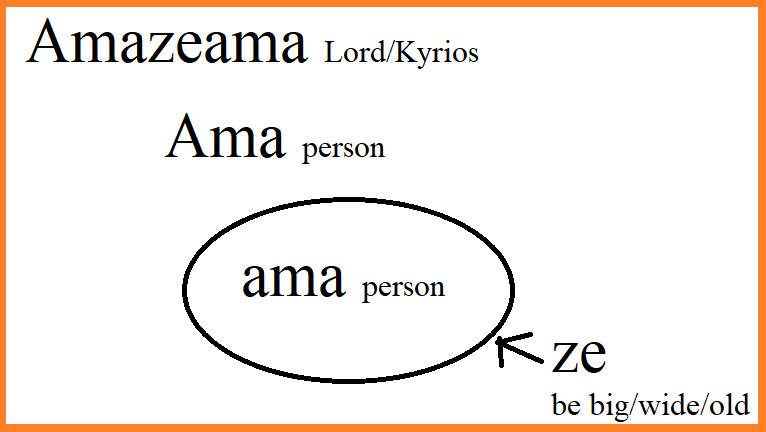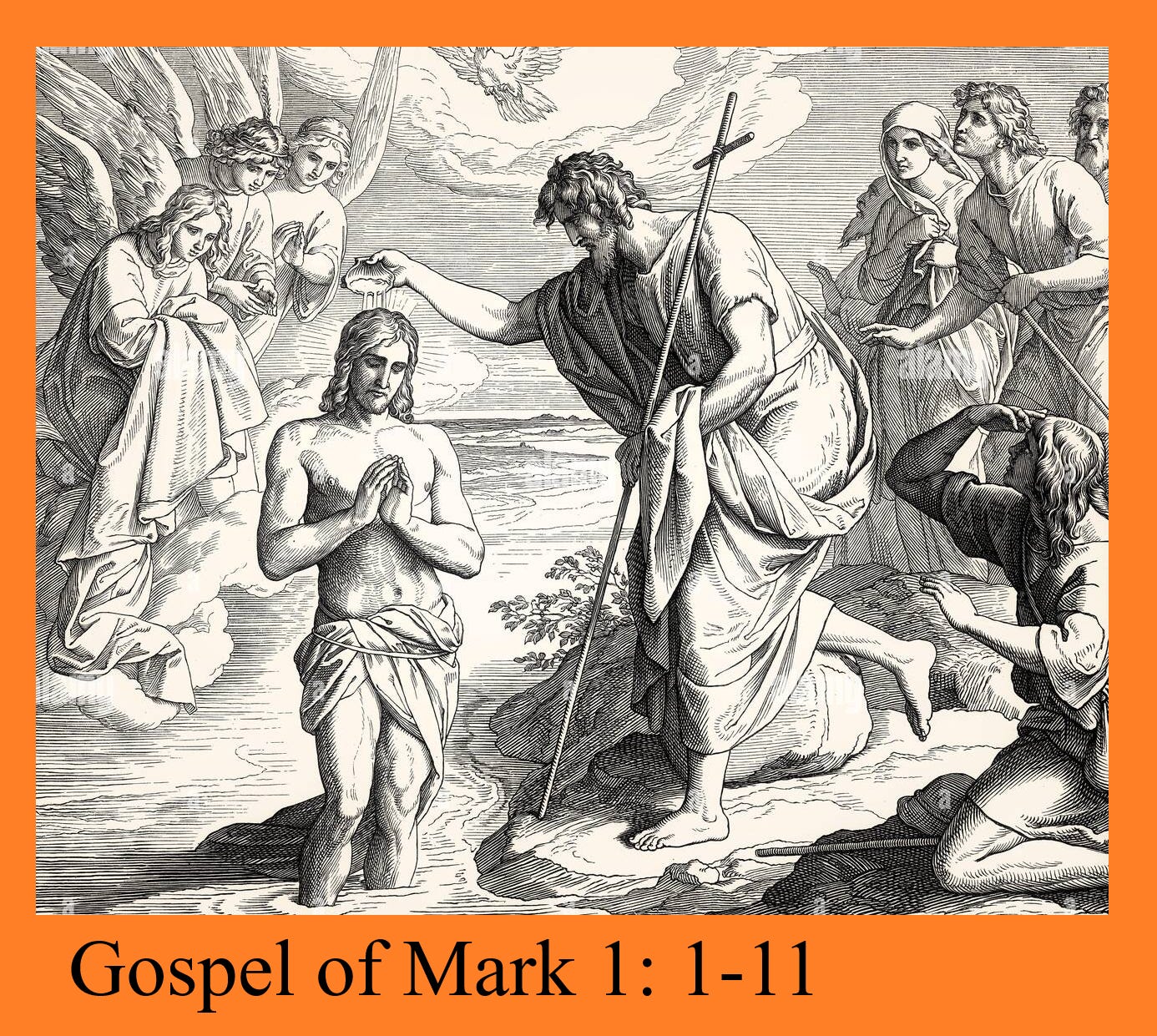The Ik language belongs to the Kuliak family, and is likely to be the only one that will survive into the next century.
The Ik homeland (Icekij) lies in the north-eastern corner of Uganda and over the border with Kenya. South Sudan lies not far to the North, but they do not share a border.
The Ik live predominantly in the Karamoja Mountains, where altitudes range from 6000 to 9000ft above sea-level, in a landscape full of valleys and plateaus.
According to Ik oral tradition, the Ik came from Egypt via Ethiopia, and a number of Ik believe that their name relates to the Hyksos people of Egyptian history.
I can neither confirm nor deny this hypothesis – my knowledge and understanding of Ancient Egypt is too small.
Sources for Ik:
Schrock, Terrill B.
- The Ik language: Dictionary and grammar sketch (Berlin: Language science Press 2017)
A grammar of Ik (Icé-tód) (Utrecht: University Press 2014)
KJV. The beginning of the gospel of Jesus Christ, the Son of God;
Ik. Itsyaketonio na maraŋa emutie Birasimae Ŋƙwaae, Tigaramatsie Ɲakuji.
Itsyaketonio = (it is) the beginning
na = that
maraŋa = is good
emutie = of the news
Birasimae = of Jesus
Ŋƙwaae = of Christ
Tigaramatsie = of the Eldest Son
Ɲakuji = of God
“gospel” comes from the Greek youangghel’eeon (ευαγγέλιον), which means good news, or “gōd spel” in Old English.
Jesus comes from the Hebrew name Yehoshua (יהושוע), which means Yahweh saves or the LORD is Salvation.
In Hebrew, Yahweh/Yehovah (יהוה) means something like the - that Becomes.
My translation of Jesus into Ik is Birasima, and it has three components:
1. bir = to help (i.e. save) by giving.
2. -asi = himself
3. ama = person.
Thus, Birasima means something like he saves others by giving himself in the flesh.
“Christ” comes from the Greek christos (Χριστός), which means one anointed with olive oil. Although they do have a word for Wild Olive tree (demio), they do not have a term for olive oil.
ŋkwaa is the Ik term for a traditional healer, who uses herbs (cemerik) and lesser spirits (ɲakujiicik) to do so.
I could not find a word for heir, and the only specific word for son was incorrect. Thus, I settled on tigaramatsi (lit. eldest child) as a compromise.
Ik has two words that refer to the Christian God – one native and one borrowed.
The native Didi-Gwari (lit. Weather-Top) is the main figure in their pre-Christian religion. He controls all weather patterns, and can be swayed through prayer and sacrifice.
The borrowed term Ɲakuj comes from Akuj, the equivalent sky-god of the neighbouring Karimojong and Turkana tribes.
The Ik themselves prefer to use Ɲakuj, so I shall use that term throughout the Ik section of this Chapter.
(Turkana and Karimojong belong to a different language family entirely – the Nilotic).
KJV. As it is written in the prophets, Behold, I send my messenger before thy face, which shall prepare thy way before thee.
Ik. Iƙirosie Biritee Ntodie noo taa: “Enes, eregia deaamaa ɲcie ekwee bie, na beresie ɲasaparia bie.”
it is written in the prophet Isaiah = iƙirosie Biritee Ntodie noo taa
iƙirosie = it is written
Biritee = in Isaiah
Ntodie = in the Prophet
noo = a long time ago
taa = [quote]
“Isaiah” comes from the Hebrew Yeshahyaw’ (ישעיה), which means Salvation of Yah. This has two components:
1. yawshah’ = to deliver.
2. Yah = short for Yahweh.
yawshah’ (ישע) also appears in Yehoshua.
My translation of Isaiah is Biriti, which has two components:
1. bir = help by giving.
2. -et = become.
“prophet” comes from the Greek profay’tace (προφήτης), which has two components:
1. pro = beforehand
2. phaymi = elevate one idea over another.
My translation of Prophet is ntodi, which has two components:
1. nee = from/through.
2. tod = language/speech.
I created the word ntodi as a direct translation of the Greek. After I did this, I checked to see if it resembled any pre-existing words.
While Ik has many words beginning with /nt/, the most relevant is ntoodo, which has two meanings:
1. ntoodó = no!
2. ntoodò = when?
The first is what the Prophets shout out to their kings.
The second is what the Kings say in reply.
look, I am going to send my messenger in front of you = enes, eregia deaamaa ɲcie ekwee bie
enes = look!
eregia = I send
deaamaa = messenger
ɲcie = my
ekwee = in the eye
bie = your
“messenger” comes from the Greek ang’elos (άγγελος), which has roughly the same meaning. (That said, a “messenger” in the Ancient World did more than simply deliver messages. Depending on context, they could do anything that their master/sender could do.)
It is also the origin of the word angel.
The Ik word deaam has two meanings:
1. footman/messenger
2. disciple/follower
deaam has two components:
1. dea = foot/leg
2. ama = person
Isaiah 52:7 (BSB)
How beautiful on the mountains are the feet of those who bring good news, who proclaim peace, who bring good news, who proclaim salvation, who say to Zion, “Your God reigns!”
who will prepare the way for you = na beresie ɲasaparia bie
na = who
beresie = will prepare
ɲasaparia = the journey
bie = your
beresie comes from ber, which has several meanings:
1. build/make
2. braid/plait/weave
3. develop a community/country
4. bombard with spears
God calls you to build his Kingdom on Earth. In the Gospels, He comes down and leads by example.
For Him, the spears were made of wood and tipped in metal.
KJV. The voice of one crying in the wilderness, Prepare ye the way of the Lord, make his paths straight.
Ik. Morokaa ikilie naloŋizatak: “Iɗimesuo ɲasaparia Amazeama, itnitetuo deamuceikaa Ntsi.”
a voice crying in the desert = morokaa ikilie naloŋizatak
morokaa = voice
ikilie = crying out
naloŋizatak = in the desert
Ik has many words that mean shout, each with different emphases.
ikil means more than bellow, holler, shout and yell.
It also means rumble, thunder and trumpet.
1 Chronicles 15:28 (BSB)
So all Israel brought up the ark of the covenant of the LORD with shouting, with the sounding of rams’ horns and trumpets, and with cymbals and the music of harps and lyres.
In 1 Chronicles Chapter 15, the Israelites are getting ready to move the Ark of the Covenant to Jerusalem. In the next chapter, they place the ark inside a tent prepared for it by King David, who joins them in singing a psalm.
prepare the way of the Lord = iɗimesuo ɲasaparia Amazeama
iɗimesuo = (all of you) prepare!
ɲasaparia = the way
Amazeama = of the Lord
Amazeama is my translation of the Greek word koo’reeos (κύριος), which means lord or master in general, and the Lord Himself in particular.
Amazeama is a pre-existing Ik word, and it has three components:
1. ama = person
2. ze = short for zoon
3. ama = person.
What does zoon mean?
1. zoon be big/huge/great
God is larger than the whole of mankind larger than all its combined works.
2. zoon be broad and wide
He holds not only the whole world, but all other worlds, in His hands.
3. zoon be old and mature
God is older than all things.
I have included a diagram. It may help, it may hinder
make His paths straight = itnitetuo deamuceikaa Ntsi
itnitetuo = (all of you) make straight!
deamuceikaa = paths
Ntsi = His
deamuceikaa comes from deamuceik, a word that I have created:
1. dea = foot.
2. muceik = paths/roads.
The original Greek word is tree’bos (τρίβος). It comes from a verb meaning rub or thresh out. Thus, it conjures up the image of a path which many feet have already worn out.
This is because there is only one way whereby we may each know Him best.
KJV. John did baptize in the wilderness, and preach the baptism of repentance for the remission of sins.
Ik. Atsuo Biretse ilumuo naloŋizatee, nda siranuo ilumesuƙotia toluutesuƙotie paka eregesukoti ɲaseconi.
John was baptising in the desert = Atsuo Birekesa ilumuo naloŋizatee
atsuo = came
Birekesa = John
ilumuo = baptising
naloŋizatee = in the desert
The name “John/Jon” comes ultimately from the Hebrew Yehhokhawnawn’ (יהוחנן), which means The LORD has been gracious. This has two components:
1. Yehovah/Yahweh
2. khawnan’ (חנן) = show favour/be gracious.
First, I had to translate Yehovah, which gave me Bireteke.
The verb tereties, means separate or segregate/show favouritism.
I combined these, creating Birekesi.
An alternative to my creation is Yoana, the Ik pronunciation of “John”, and which is used for the eponymous books in the bible.
proclaiming a baptism of repentance = nda siranuo ilumesuƙotia toluutesuƙotie
nda = and
siranuo = proclaiming
ilumesuƙotia = baptism
toluutesuƙotie = of repentance
“baptism/baptise” comes from the Greek baptizo (βαπτίζω), which means dip or submerge – usually in a ceremonial setting.
The Ik Verb ilum means dip (into liquid) or submerge.
ilumesuƙoti means much the same, but means that it is complete.
“repentance” comes from metan’oyha (μετάνοια), which originally means change of mind or change in the inner man. (after-thought is the most literal translation).
toluutesuƙoti means change allegiances or turn against.
It has two components:
1. toluunos = betray.
2. -uƙoti = Complete/Away.
What happens during baptism?
You promise to turn away from the Devil and all His works.
Your sins are washed away, and you move on – away from your previous life of sin.
for the forgiveness of sins = paka eregesuƙoti ɲaseconi.
paka = for
eregesuƙotie = the forgiveness
ɲaseconi = of sins
“forgiveness” comes from the Greek af’esis (άφεσις), which means sending away/letting go.
I created ergesuƙoti from two components:
1. ereges = send
2. -uƙoti = Away.
Ik currently has two words that mean forgive. Each has a different emphasis:
1. ogoes = leave/excuse/exempt.
2. iƙenes = have mercy/pardon.
The full passage in Ik:
1. Itsyaketonio na maraŋa emutie Birasimae Ŋƙwaae, Tigaramatsie Ɲakuji.
2. Iƙirosie Biritee Ntodie noo taa: “Enes, eregia deaamaa ɲcie ekwee bie, na beresie ɲasaparia bie.”
3. Morokaa ikilie naloŋizatak: “Iɗimesuo ɲasaparia Amazeama, itnitetuo deamuceikaa Ntsi.”
4. Atsuo Biretse ilumuo naloŋizatee, nda siranuo ilumesuƙotia toluutesuƙotie paka eregesukoti ɲaseconi.
5. Nda atsuo keŋana ntsie kijoo Goosokijoo nda Loŋazutwama, nda ilumosatie saboo na iŋoɗyaimeta, bolesuƙotata ɲaseconie amutsak.
6. Ŋabuo Birekesa ɲakaasa ɲakaalee nda ɲamisipa ɦyojejek, ƙidzuo girwaa nda gafariyoo ɗaɗahwaa rowao
7. Siranuo, todetuo taa: “Atsa ntsi seamucee ɲcie na ŋixona ɲcu – nta ŋabonuƙota dugumetonie nda hoɗesie ƙiwee ŋaɗetaiyee Ntsi.
8. Ilumia bee bitia cwo, iluma bitia taa Suguro na Da
9. Atsini odoicikaa sini atsa Birasima napei Buɓetonuo Tsiɓulakoni nda ilumosa sabee na iŋoɗyaimeta Birikeso.
10. Nda ɗir totirie kimatso cuaakuo, enio ɗusie didigwariya nda ntsie kidzimie Sugura ɗita biba.
11. Nda atsa morokua nee didigwari: “Iyida bia Ɲcie Tigaramatsuo minesuk; bie cionuƙotia.”







